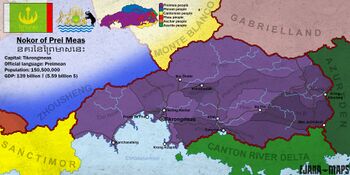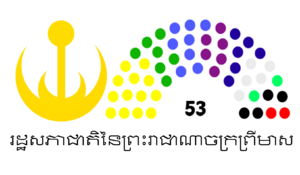Prei Meas: Difference between revisions
No edit summary |
No edit summary |
||
| Line 1: | Line 1: | ||
{{Infobox country | {{Infobox country | ||
|conventional_long_name = | |conventional_long_name = Nokor of Prei Meas | ||
|native_name = ''នគរនៃព្រៃមាសនេះ'' <small>([[Preimean language|Prei]])</small> | |native_name = ''នគរនៃព្រៃមាសនេះ'' <small>([[Preimean language|Prei]])</small> | ||
|common_name = Prei Meas | |common_name = Prei Meas | ||
| Line 122: | Line 122: | ||
==== Senate ==== | ==== Senate ==== | ||
The senate composes of 3 seats for each province with all 3 dedicated to the party that won the majority of the province. 1 province's 3 seats will be made speaker if their party has the majority of seats in the senate and there will be 4 additional seats in the cross bench made of the following people. The Ste ch, The Prime Minister, The President of the Peoples House, and the Second Minister. | The senate composes of 3 seats for each province with all 3 dedicated to the party that won the majority of the province. 1 province's 3 seats will be made speaker if their party has the majority of seats in the senate and there will be 4 additional seats in the cross bench made of the following people. The Ste ch, The Prime Minister, The President of the Peoples House, and the Second Minister. | ||
Revision as of 19:13, 20 July 2020
Nokor of Prei Meas នគរនៃព្រៃមាសនេះ (Prei) | |
|---|---|
| Motto: "ខ្លាំងដើម្បីប្រយុទ្ធប្រឆាំងនឹងអារក្ស " "Strong to frighten the devil" | |
| Anthem: "Nokor reach" | |
 detailed map of Prei Meas | |
| Capital and largest city | Tikrongmeas |
| Official languages | Preimean |
| Recognised regional languages | Phnom, Cantonese, Aschar, Minean, Phau, Azurite |
| Demonym(s) | Preimea |
| Government | constitutional monarchy |
• Ste ch | Rathanak I Sisowath |
• Prime Minister | Bun Veasna |
| Legislature | United Chamber |
| National Parliament Senate | |
| People's house | |
| Establishment | |
• Independence day | January 14 1949 |
| Area | |
• Total | [convert: invalid number] |
• Water (%) | wip |
| Population | |
• Estimate | 150,506,301 |
• 2016 census | 150,500,000 |
| GDP (nominal) | 2017 estimate |
• Total | ៛139,000,000,000,000 (wip) |
• Per capita | ៛80,123 |
| Gini (2015) | low |
| HDI (2020) | very high |
| Currency | Prei Meas Riel (៛) (PMR) |
| Time zone | UTC-4 and -3 (PMT) |
| Date format | dd ˘ mm ˘ yyyy |
| Driving side | right |
| Calling code | +0 |
| Internet TLD | .pm |
Prei Meas is a medium sized Constitutional Monarchy situated at -55° West, and 0° North. The Capital and largest city is Tikrongmeas literally meaning "City of Gold" in the local language. Everything isn't all golden in Prei Meas though as in the western Phau and Minean regions there are separatist movements causing instability and and estimated 500 died in the fighting there since 2018 not including the recent PLG conflict and spillovers into and from the Azureden conflict.
History
WIP summary The earliest people in Prei Meas lived there in 5000 BCE. Through the medieval Period the 1st Nokor only hugged the coast and became rich from the spice and gold trade. It then subjugated the Phnom tribes and the Preimean empire was formed after subjegations of the Phau and Minean people and crucial parts of the modern Cantonese river delta controlling trade through that very important strait. This would not last as the Empire's vicious lust for conquest alienated trade and the Prei Meas Empire slowly declined. This lasted until the 1890s when Prei Meas was colonized by Neuewland and after a brief guerrilla war Prei Meas gained independence again.
Geography
Climate
The climate of Prei Meas with the exception of the northern steppes and mountains of the Phnom province is relatively uniform.
environment
Politics
The political landscape of Prei Meas is as diverse as the people. There are parties ranging from centrist to moderate left and right and religious parties. Two major factors influencing Prei Meas politics is the Phau Conflict, and the conflict in Azureden both taking place in the turbulent Eastern half of the country. In the west the Nokor is more populated by ethnic Aschar people and ethnic Preimean people. In a relatively stable and rich part of the country dotted with heavily populated cities with beautiful scenery and large industry where the country makes most of its income and where most of the country lives. In the East there is a deep contrast between the north populated by Ethic Phnom people who are typically loyal to the central government and work with it in combating insurgents. The south is inhabited jointly by ethnic Cantonese people and Preimean people. The Center of the East is the most unstable part of the country. It is the region inhabited by ethnic Azureden people, Phau people, and Minean people. The Phau and Minean regions are the most densely forested parts of the country and one of the poorest regions of the country. Here there are constant conflicts between the central government and Phau and Minean separatists and insurgents who wage a brutal guerrilla war.
Government
Peoples House
The Peoples House has 53 seats elected from the country as a whole. The following is a diagram of the current Peoples House.
Senate
The senate composes of 3 seats for each province with all 3 dedicated to the party that won the majority of the province. 1 province's 3 seats will be made speaker if their party has the majority of seats in the senate and there will be 4 additional seats in the cross bench made of the following people. The Ste ch, The Prime Minister, The President of the Peoples House, and the Second Minister.


